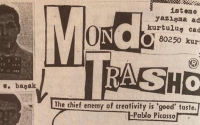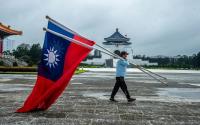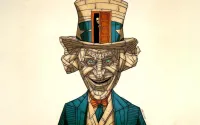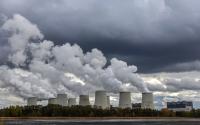Brazil is a major country in the world-system. Its large size, its large population, its role as a leader of Latin America, and its strength as a semiperipheral state all mean that what happens in Brazil is of great consequence in terms of both the geopolitical arena and the structure of the world-economy. In 2002, for the first time in Brazil's history, the candidate of a left party, Luiz Inácio da Silva ("Lula") of the Partido dos Trabalhadores (PT), won the elections, and seemed to signal a resurgence of left forces in Latin America and the South in general. Yet, only ten months later, the reviews of commentators, both Brazilian and foreign, are very mixed. Once again, the question is being asked whether it is possible to sustain an elected left government, one that will pursue a policy in opposition to the forces of neo-liberalism, in a country of the South? Or are the counterpressures of the United States, the IMF, and major capitalist forces too strong?
First, we should look at the correlation of forces at the moment of Lula's election. Lula obtained an electoral majority by forging an alliance with other parties (mostly of the center). His party is a minority party in the Brazilian parliament. Brazil has nearly the world's record in terms of internal inequalities. A large part of the rural population is landless. The country was bound by agreements made by the previous regime with the IMF. Brazil had a large debt and a relatively small amount of cash reserves. In the six months prior to Lula's election, he was clearly being threatened by a massive withdrawal of investment and financial inflows, if he failed to "reassure" world capital that he would not engage in measures that they considered hostile. On the other hand, he was swept into office by popular enthusiasm, both for him personally and for the anti-neoliberal program he and his party represented. For Lula and for Brazilians, especially the poor, hope had conquered fear (see Commentary No. 100, Nov. 1, 2002).
There are three arenas which dominate political concerns of Brazilians: economic policy, land reform, and foreign policy. Lula's government clearly decided to move first in the arena of economic policy. Lula gave certain guarantees to international capital, even before his inauguration. He insisted that Brazil would continue to emphasize the fight against inflation. He appointed Henrique Mireilles, who had been head of the Bank of Boston, as the head of the Central Bank. Mireilles had actually supported Lula's opponent during the elections. The rest of Lula's economic team are also persons who are anxious to pursue policies that will not antagonize international capital. In its defense, the government says that it is seeking to renegotiate its accord with the IMF in ways that will reduce constrictions on infrastructural and social investment, or even dispense with an agreement altogether.
Two major economic decisions of the initial ten months stand out. The Brazilian government has maintained an extremely high interest rate on its bonds (although they have lowered it from 26% to 22%). And the Brazilian government has passed a reform of the social security system which reduces considerably government pensions. Both actions are financially conservative. Both actions have been severely criticized by left intellectuals, but also by some business sectors who feel that the high interest rates make it impossible for them to expand their economic role (as opposed to the economic role of foreign banks and large-scale Brazilian enterprises linked to them). These left intellectuals had promoted instead a "productive shock" through the radical lowering of interest rates. One of them, Emir Sader, talks of a "lost opportunity," whose very negative effects will be felt in the near future.
In the arena of agrarian reform, the government has been far more cautious than in economic policy. Thus far, it has done very little. But Lula has made an effort to keep the support of the Movimento dos Sem-Terra (MST, or the Movement of the Landless), who were a major historic pillar of the PT, and who continue to have the support of a major segment of the Catholic Church as well as the Coordenação dos Movimentos Sociais (which groups a large number of powerful trade-union, student, and church organizations). The MST engages in occupations of unused land (which represents a significant part of Brazil's acreage). The government's official position is that the government should buy this land from its owners and turn it over to the landless. The problem is that it doesn't really have the money to do this, and its economic policy is not one that will augment the sums necessary in any short time. The MST is not waiting, and continues to occupy land. It is met by resistance, often armed resistance, from the large landowners, who regard the MST as a dangerous movement that should be crushed, or at least curbed. These landowners are not for the most part ready even to sell their land, much less give it up without compensation.
The MST recently asked for an audience with Lula, which he granted on June 24, much to the public dismay of the landowners. In his talk with the leaders of the MST, Lula asked them for "patience" and reaffirmed his "moral and historic commitment" to agrarian reform. One of the leaders of the MST, João Paulo Rodrigues Chaves, said they still had faith in Lula, but he warned that he had to "implement real changes" no later than the end of 2003. We shall see if he is able to do that.
Finally, in the arena of foreign relations, which even his left intellectual critics agree is his best showing, Lula has moved in various ways to show his colors. He has reached out strongly to other leaders of South America - not only Venezuela and Argentina - but also Peru which he visited this month, pushing the idea that Mercosur (Mercosul in Portuguese) must be strengthened, widened, and become a major force on the world geopolitical scene. Mercosur is today the embryo of an economic union, with only four full members who have reduced tariffs between each other. Its strength is about that of the early forms of the European Union some 30-40 years ago.
Of course the major issue is how Mercosur relates to the Free Trade Agreement of the Americas (FTAA, or ALCA in Spanish and Portuguese), being promoted by the United States. The U.S. basically regards Mercosur as at best a nuisance and at worst an enemy. The U.S. wants a free trade agreement that would open Latin American countries to its financial institutions and would guarantee intellectual property. The Latin Americans are interested in access for their manufactures to the U.S. market. Each side basically hopes to veto or put off the primary demands of the other side by insisting that the questions each doesn't like be treated within the framework of the World Trade Organization (rather than bilaterally) where each believes it can find support.
In the end, U.S.-Brazilian divisions over FTAA/ALCA are the key apple of discord. If Lula holds strongly to his position, he will find that he has made a big difference in world geopolitics and that therefore the Bush government may give him no quarter. If he doesn't, however, he may have little to show for his term of office.
Brazil is already in the midst of electoral maneuvers. There are legislative elections in 2004 and presidential elections in 2006. The PT has outlined the list of parties with which it wishes to make alliances and those that it wishes to oppose at all costs. Lula says he doesn't know if he will run again. But no one believes him. And his polls at the moment are good. He is a charismatic figure and there is no visible opponent of stature.
What kind of government is the government of Lula? His supporters say that it is a government of the center-left (necessarily, because of the alliances). He himself said this August that he is not and has never been a "leftist," although his public declarations in the past seem to belie this, since he spoke of being part of the Latin American left with a socialist perspective. Some left intellectuals in Brazil now are saying that his government is a right-wing government, even though they also say there is no left party to contest him.
In neighboring Argentina, President Kirchner is pursuing the policy many expected or hoped that Lula would pursue and which was not expected of Kirchner. But Lula and Kirchner have different social and cultural "constraints," as the left Uruguayan publicist, Raúl Zibechi, has recently reminded us, Argentina having a middle class that has lost considerable income recently whereas Brazil has a middle class that is still moving upwards. Can Lula move more in the direction which the PT represented historically in Brazil? That depends in part on how far he succeeds with Mercosur. It also depends, and few acknowledge this, on how much trouble George Bush finds himself in. To the degree that the U.S. in is political and economic difficulty, the room for manoeuver of a government like that of Lula, will increase considerably. The picture will become much clearer in 2003.






